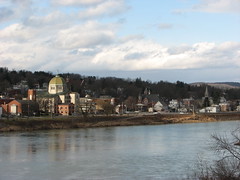Marcellus Shale: DEP Help Needed

Image by mdmarkus66
“You haven’t mentioned the Marcellus Shale to me since we talked about China,” my friend says as we settle at a table in the Weigh Station Café. I hesitate, not sure that I want to spend our lunchtime talking about natural gas, but can’t resist. “Well, I got sidetracked by the election, and then the holidays, but I’ve been reading a lot about it again lately. And no, I haven’t gotten any cozier with Marcellus over the past few months.
I’m not alone. Recently, representatives from thirteen organizations (see below) signed a letter addressed to John Hanger, Acting Secretary of Pennsylvania’s Department of Environmental Protection. The first paragraph of the letter follows here:
“We understand that natural gas drilling could potentially be a major new source of revenue and business development in Pennsylvania. At the same time, however, the undersigned organizations are concerned that this drilling must be done in a manner that does not damage our state’s natural resources, particularly our water resources and the plants and animals that they support. If the rush to drill is allowed to go forward without adequate permit conditions and oversight, it could irreparably and unnecessarily harm habitat and water sources, de-watering streams, damaging water and air quality, fragmenting forests and impacting threatened and endangered species in some of the most pristine parts of our state.”
In order to avoid or minimize serious negative consequences to our land, water, air, and wildlife, the letter asks that the DEP be proactive in handling Marcellus Shale drilling issues. As the drilling rigs begin to multiply across the state, what should DEP tackle? These organizations specifically outline areas of concern: water withdrawals and treatment, discharge of back flows, habitat destruction, erosion and sediment runoff from drill sites, road and pipeline construction, air emissions from drill sites, truck traffic, chemical additives, and adequate DEP staffing. To illustrate one specific area of concern, the letter writers remind Mr. Hanger of recent trouble in southwestern Pennsylvania:
“The recent incident of TDS (total dissolved solids) overloading in the Monongahela River, which resulted in the Department advising 325,000 people to use bottled water, is clear and undeniable testimony that the state’s sewage facilities cannot handle the wastewater currently being produced by gas drilling and development. While not the only cause of the recent TDS overload, gas and oil drilling wastewater has been identified by the Department as a significant contributor, leading the state to order a mandatory reduction in the amount of gas well wastewater the sewage treatment facilities can take. This situation begs the question, “How will the wastewater from the current and planned expansion of natural gas well development be safely treated and disposed and who will bear this cost?” Certainly, the cost to the public, to water suppliers, and municipal wastewater facilities has been great in the Monongahela River region. This question must be adequately and fully answered before the industry moves forward with well development, or the story of the Mon (Monongahela) is doomed to be repeated throughout the Commonwealth.”
A more recent incident provides another real example of the organizations’ concerns. Earlier this month, an explosion at a private well in Dimock Township drew DEP officials to northeastern PA. After finding elevated natural gas levels in four water wells, DEP sent letters to twenty homeowners in the area outlining the dangers of gas trapped in water wells, suggesting that they vent them. The official source of the gas is undetermined at this time – possibly a natural phenomenon or perhaps a result of nearby drilling by Cabot Oil & Gas, which operates several Marcellus Shale drilling sites near the explosion site. While DEP conducts its tests to determine the source, Cabot is providing water to the four affected homes.
We must wait for DEP’s test results to discover whether natural gas drilling caused this particular case of contamination. Regardless of the results though, questions arise about the impact of gas leaks into water supplies. While several news reports about the Dimock situation stated that the gas in the water wells did not pose a threat for drinking, the official DEP news release seems less reassuring. According to DEP, “drinking water standard limitations have not been established for natural gas and associated health risks have not been identified.” Like so many other questions posed by The Marcellus, we must wait for a clear answer.
Finished with lunch, my friend and I step out onto the deck of the Weigh Station, looking across the street to the Susquehanna River flowing by, already offering up its waters to the great Marcellus thirst. We part ways, only after he promises to send a letter to the DEP. As I climb into my car, I start imagining my own letter…Dear Mr. Hanger…
With enormous economic potential at stake, voices clamor loudly across Pennsylvania for full-speed-ahead drilling in the Marcellus. Equally vocal voices are needed to protect our drinking water, our streams and rivers, our land, and our air quality from the impacts of natural gas drilling. Please add your voice for caution and vigilance by sending a letter to Mr. Hanger.
Mr. John Hanger
Acting Secretary
Department of Environmental Protection
Rachel Carson State Office Building
Harrisburg, PA 17105
Signatures on the letter to DEP mentioned earlier in this post represent these organizations:
Pennsylvania Campaign for Clean Water
Center for Coalfield Justice
Center for Healthy Environments and Communities
Chesapeake Bay Foundation
Citizens for Pennsylvania’s Future
Clean Water Action Justice
Damascus Citizens for Sustainability
Delaware Riverkeeper Network
Mountain Watershed Association
PennEnvironment
PA Chapter of the Sierra Club
Pennsylvania Trout Unlimited
Youghiogheny Riverkeeper